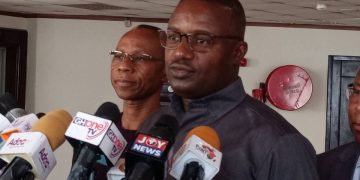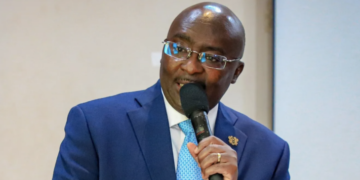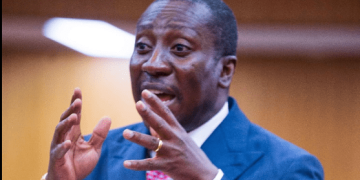The transformative role of digitalisation in Africa’s economic growth was a key focus at the 2025 World Economic Forum (WEF) in Davos, Switzerland.
The four-day summit, attended by over 60 world leaders and global economic giants, addressed pressing issues including economic growth, climate change, and emerging technologies.
A special session on Africa highlighted the consensus that embracing digital technologies such as artificial intelligence (AI), the Internet of Things (IoT), and broader economic digitisation is indispensable for Africa’s development.
This global acknowledgement validates the digitalisation agenda spearheaded by former Ghanaian Vice President Dr. Mahamudu Bawumia, whose initiatives have profoundly reshaped governance and service delivery in Ghana.
Dr. Bawumia’s policies focused on leveraging technology to enhance efficiency, transparency, and accessibility in public services.
Key projects such as the Ghana Card, the National Digital Property Addressing System, and the Mobile Money Interoperability System reflect Ghana’s pioneering efforts in digital
At a pivotal roundtable discussion, Botswana’s President Duma Boko and AfCFTA Secretary General Wamkele Mene underscored the urgency of creating a robust digital economy in Africa to unlock opportunities for its youthful population.
President Boko referred to digital technology as “the language of young people” and stressed its integration into all sectors of African economies.
“Adopting digital technologies is the way forward to address many of our challenges,” he stated.
AfCFTA’s Secretary General, Wamkele Mene, stressed the imminent adoption of the Africa Digital Trade Protocol, which aims to facilitate seamless digital trading across the continent. He emphasized that Africa’s youthful workforce must be empowered through digital innovation, enabling intra-continental trade and addressing key challenges such as youth unemployment.
South African President Cyril Ramaphosa echoed similar sentiments, emphasizing that digitisation is Africa’s pathway to sustainable development.
“The digitisation of the continent, particularly through artificial intelligence, will enhance trade, development, and progress across all sectors,” he said.
President Ramaphosa projected that Africa’s digital economy could contribute an estimated $1.5 trillion to the continent’s GDP by 2030, transforming agriculture, healthcare, education, and governance.
Dr. Bawumia’s leadership has made Ghana a trailblazer in digital transformation across Africa. His vision has spurred significant achievements:
The biometric Ghana Card provides a secure and reliable method of identifying citizens and residents. It improves access to public services such as healthcare, education, and social assistance while enhancing security.
This initiative allows seamless transfers between mobile money platforms and banks, boosting financial inclusion. Ghana became one of the first countries in Africa to implement a universal QR Code payment system that integrates bank accounts and mobile wallets.
Also known as Ghana Post GPS, this system assigns unique digital addresses to properties, improving navigation, service delivery, and emergency response.
The paperless port system has streamlined operations at Ghana’s ports, reducing time and cost for businesses. Similarly, the e-procurement platform has increased transparency and reduced corruption in public procurement processes.
The Medical Drone Delivery System, the largest of its kind in the world, ensures on-demand delivery of medical supplies to over 2,000 health facilities. Additionally, innovations like the NHIS mobile renewal service and the e-pharmacy platform have enhanced healthcare accessibility and efficiency.
The WEF 2025 underscored the transformative potential of a digital African economy, emphasizing its role in: Boosting agricultural productivity, enhancing government efficiency, expanding access to quality healthcare, supporting environmental sustainability, and innovating education to meet the needs of a dynamic youthful population.
Leaders agreed that Africa’s journey towards digital transformation requires bold leadership, investment, and collaboration. As AfCFTA’s Wamkele Mene aptly stated, “The starting point is to write the laws that give investors confidence. From there, we can build a digital Africa that provides opportunities for our youth and fosters sustainable growth for the entire continent.”
The digital solutions introduced under Dr. Bawumia’s leadership have significantly increased productivity, reduced costs, and improved transparency across various sectors in Ghana. These initiatives not only address current challenges but also position Ghana as a regional digital hub, inspiring other African nations to adopt similar measures.
As the global economy becomes increasingly digital, Ghana’s success demonstrates the transformative power of political will, vision, and innovation.
The groundwork laid by Dr. Bawumia ensures that Ghana remains at the forefront of Africa’s digital revolution, contributing to the continent’s broader economic transformation.



















































































